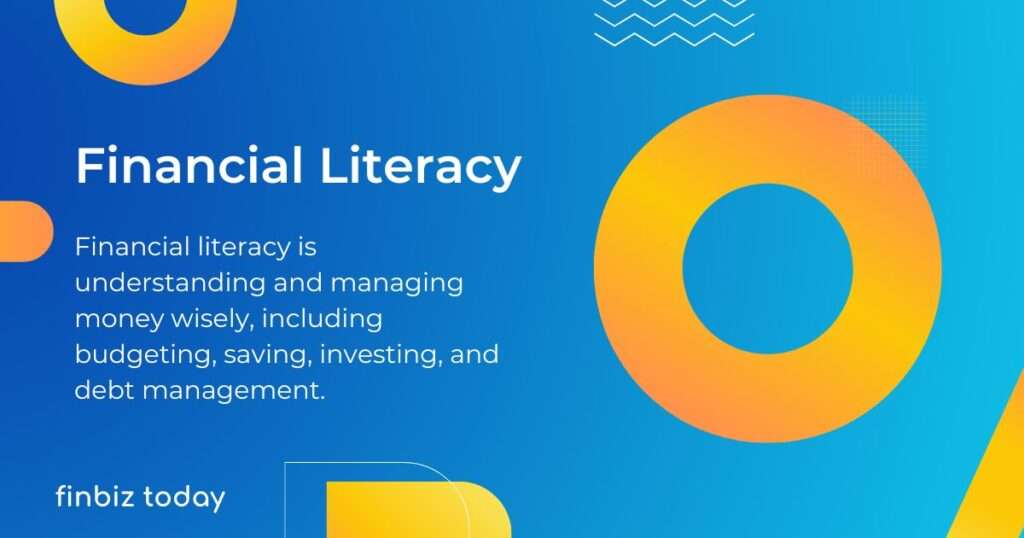In this article, we’ll explore the definition, importance, and practical applications of financial literacy, equipping you with the knowledge and tools necessary to navigate the complex landscape of personal and business finances.

What is Financial Literacy?
Financial literacy encompasses the knowledge, skills, and attitudes necessary to make informed decisions about managing money, budgeting, saving, investing, and planning for the future. It involves understanding key financial concepts such as budgeting, debt management, investing, retirement planning, and risk management. Essentially, financial literacy empowers individuals to take control of their financial destiny and achieve their long-term goals.
Why is Financial Literacy Important?
Financial literacy is essential for achieving financial independence and security. It equips individuals with the knowledge and skills needed to make sound financial decisions, avoid debt traps, and plan for the future. Moreover, financial literacy fosters economic stability and prosperity at both the individual and societal levels. By promoting responsible financial behavior and informed decision-making, financial literacy helps individuals build wealth, mitigate financial risks, and achieve their life goals.
Definition of Financial Literacy
Financial literacy encompasses the capacity to comprehend and efficiently oversee personal finances. It encompasses knowledge of financial concepts, such as budgeting, saving, investing, and debt management, as well as the skills to apply this knowledge in real-life situations. Financial literacy empowers individuals to make informed financial decisions, plan for the future, and achieve their financial goals.
Benefits of Financial Literacy
The benefits of financial literacy are manifold. Firstly, it enables individuals to make informed decisions about their finances, leading to better financial outcomes and improved overall well-being. Financially literate individuals are better equipped to manage debt, save for emergencies, and plan for retirement. Moreover, financial literacy promotes economic stability and growth by reducing financial vulnerabilities and promoting responsible financial behavior.
The Keys to Financial Literacy
The keys to financial literacy include understanding basic financial concepts, developing good financial habits, and continuously educating oneself about personal finance topics. It’s essential to budget effectively, live within one’s means, and prioritize savings and investments. Additionally, staying informed about economic trends, investment strategies, and financial products can help individuals make sound financial decisions and achieve their long-term goals.
Financial Literacy in Simple Terms
In simple terms, financial literacy refers to the ability to understand and manage money effectively. It involves knowing how to budget, save, invest, and plan for the future. Individuals well-versed in financial matters possess the expertise and capabilities to make prudent financial choices in accordance with their aspirations and principles.
The Stages of Financial Literacy
The stages of financial literacy vary from basic to advanced levels of understanding and proficiency. At the basic level, individuals may be aware of basic financial concepts such as budgeting and saving. As they progress, they may develop a deeper understanding of investing, retirement planning, and risk management. Ultimately, advanced financial literacy involves mastery of complex financial concepts and the ability to apply them in various financial situations.
The Golden Rule of Financial Literacy
The golden rule of financial literacy is to spend less than you earn and save/invest the difference. This fundamental principle underscores the importance of living within one’s means, avoiding debt, and prioritizing savings and investments for long-term financial security.
Examples of Financial Literacy
Examples of financial literacy include creating and sticking to a budget, paying off high-interest debt, saving for emergencies, investing in retirement accounts, and diversifying investment portfolios. Additionally, understanding financial statements, evaluating financial products, and managing financial risks are essential components of financial literacy.
The Principles of Financial Literacy
The principles of financial literacy include budgeting, saving, investing, debt management, risk management, and retirement planning. These principles guide individuals in making informed financial decisions and achieving their financial goals. By applying these principles effectively, individuals can build wealth, mitigate financial risks, and secure their financial future.
Financial Literacy in Business
In the business context, financial literacy refers to the ability to understand and analyze financial information related to business operations. It involves interpreting financial statements, evaluating investment opportunities, managing cash flow, and making strategic financial decisions to optimize business performance and achieve long-term growth and profitability.
Advantages and Disadvantages of Financial Literacy
The advantages of financial literacy include better financial decision-making, improved financial well-being, and enhanced economic stability. Financially literate individuals are better equipped to manage debt, save for the future, and invest wisely. However, a potential disadvantage of financial literacy is that it may lead to overconfidence or complacency, prompting individuals to take excessive risks or neglect essential aspects of financial planning.
Conclusion
In conclusion, financial literacy is a critical skill set that empowers individuals to take control of their financial future and achieve their life goals. By understanding key financial concepts, developing good financial habits, and continuously educating themselves about personal finance topics, individuals can build wealth, mitigate financial risks, and secure their financial well-being. Whether you’re budgeting for daily expenses, saving for retirement, or investing in the stock market, financial literacy is the key to unlocking financial freedom and prosperity. Start your journey towards financial literacy today and pave the way for a brighter financial future.

